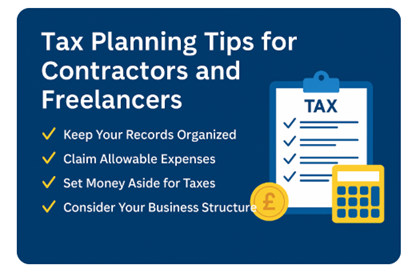-
News
-
Blog
-
Archive

Managing your own taxes can be challenging when you're a contractor or freelancer. Without the cushion of an employer's payroll team, you're responsible for calculating, filing, and paying your taxes accurately and on time. This is where strategic tax planning can make a significant difference, not only in meeting your obligations but also in maximising your take-home pay. Whether you're a self-employed consultant, a tradesperson under the Construction Industry Scheme (CIS), or a creative freelancer, these tax planning tips will help you stay compliant while improving your financial position.
1. Understand Your Tax Status
The first step in effective tax planning is understanding your tax status. Contractors and freelancers in the UK usually fall under Self Assessment, meaning you must file an annual tax return with HM Revenue & Customs (HMRC).
If you operate as a sole trader, you pay income tax and Class 2 and Class 4 National Insurance contributions on your profits. If you run your business as a limited company, you'll need to pay Corporation Tax on company profits and may also pay yourself a combination of salary and dividends.
Speaking to accountants in Bolton and Manchester can help you decide the most tax-efficient business structure for your circumstances.
2. Keep Accurate Records Year-Round
Accurate bookkeeping is the foundation of tax planning. You should keep a record of all invoices, receipts, and expenses, whether in paper form or using cloud accounting software like Xero or QuickBooks.
Key records to maintain include:
- Invoices issued and received
- Bank statements
- Expense receipts (digital copies are acceptable)
- Mileage logs if claiming vehicle expenses
- CIS deduction statements (if applicable)
By keeping records updated monthly, you'll avoid the year-end scramble and reduce the risk of errors that could trigger HMRC penalties.
3. Claim All Allowable Expenses
One of the biggest advantages of being self-employed is the ability to deduct allowable business expenses from your taxable income. This reduces the amount of profit on which you pay tax.
Common allowable expenses include:
- Office supplies and software subscriptions
- Professional fees (e.g., accountants)
- Travel and mileage (45p per mile for the first 10,000 miles)
- Marketing and advertising costs
- Training courses related to your work
- Mobile phone and internet costs (business proportion)
Tip: Always keep receipts and annotate them with the business purpose. HMRC can disallow claims without adequate evidence.
4. Plan for Tax Payments in Advance
A common mistake freelancers make is treating all income as spendable. Remember, a percentage of your earnings belongs to HMRC.
To avoid payment shocks:
- Set aside 20–30% of each payment for tax and National Insurance.
- Use a separate “tax savings” bank account to avoid accidental spending.
- Understand Payments on Account, which are advance tax payments due on 31 January and 31 July if your bill exceeds £1,000.
If cash flow is tight, accountants in Bolton and Manchester can advise on payment plans or reducing Payments on Account if your income has dropped.
5. Consider the VAT Threshold
If your turnover exceeds £90,000 (2024/25 threshold), you must register for VAT. Even if you're below this threshold, voluntary registration can sometimes be beneficial — especially if your clients are VAT-registered businesses.
You can choose from different VAT schemes, such as:
- Standard VAT Scheme
- Flat Rate Scheme (simplifies VAT reporting for small businesses)
- Cash Accounting Scheme (pay VAT on invoices only when paid)
Choosing the right scheme can improve your cash flow and reduce admin.
6. Make Use of Tax-Efficient Investments
Self-employed professionals can reduce their taxable income through certain investments and pension contributions.
Examples include:
- Pension Contributions: Payments into a registered pension scheme qualify for tax relief.
- ISAs: While ISA contributions don't reduce taxable income, interest and gains are tax-free.
These strategies not only reduce current tax bills but also support long-term financial security.
7. Stay Ahead of Deadlines
Missing tax deadlines results in instant penalties — even if you have no tax to pay. Key deadlines for contractors and freelancers include:
- 5 October: Register for Self-Assessment if newly self-employed.
- 31 October: Paper return deadline.
- 31 January: Online filing and payment deadline.
- 31 January & 31 July: Payments on Account deadlines.
Use calendar reminders or accounting software alerts to ensure nothing is missed.
8. Seek Professional Advice Early
The UK tax system is complex, and rules change frequently. By consulting with a professional accountant early — rather than waiting until tax return season — you can:
- Identify tax-saving opportunities
- Avoid compliance mistakes
- Plan business finances effectively
Specialist accountants can also represent you in HMRC enquiries, provide sector-specific advice (e.g., CIS rules for construction contractors), and support you in scaling your business.
Final Thoughts
Tax planning for contractors and freelancers is about more than just filling in a tax return — it's about structuring your finances to work smarter, not harder. By keeping accurate records, claiming allowable expenses, planning ahead for tax payments, and getting expert guidance, you can significantly improve your financial outcomes.
If you're looking to optimise your tax strategy, YRF Accountants' experienced accountants in Bolton and Manchester are here to help. We offer personalised advice to contractors and freelancers, ensuring you keep more of your hard-earned money while staying fully compliant.